Allison Zmuda is an education consultant specializing in curriculum, assessment, and instruction. She works with national and international educators to design learning experiences that are relevant, meaningful, challenging, and appropriate. Previously, she served as a high school social studies teacher for eight years. Allison has authored eleven books and co-developed a series of online courses.
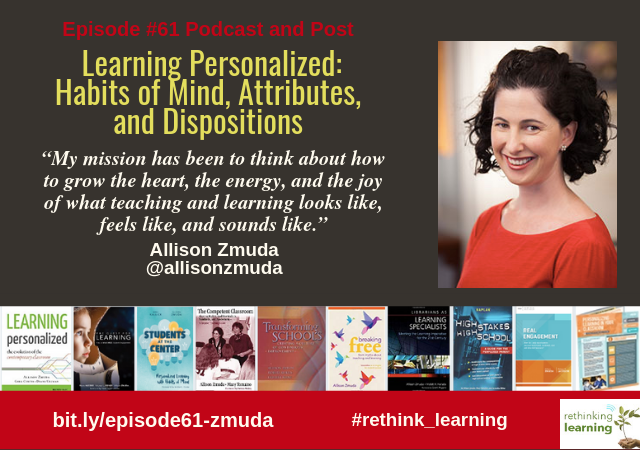
Podcast: Play in new window | Download
Subscribe: Spotify | TuneIn | RSS
I have read several of Allison’s books, follow her on social media, and was very excited to have a conversation with her. I learned so much about her and am honored to share her story with you. Enjoy!
You and your family
My husband, Tom, and I have two children, my son, Cuda, and my daughter, Zoe. We lived in a small town in Connecticut. When my son was in second grade and my daughter was in preschool going to start Kindergarten, I was looking around to what kind of public school system for my kids could have to grow. So we settled on Virginia Beach. I was doing some consulting work there for a couple of years. The level of innovation that was happening there at the time as well as the level of diversity was what we wanted. The opportunity to see what’s possible when you have a large scale school system as opposed to a regional small town system.
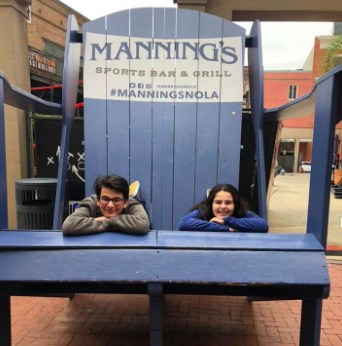
I wanted my kids to experience a range of perspectives, points of views, diversity, and also wanted to make sure they received a high-quality education. We moved to Virginia Beach with 68,000 students, eleven high schools, and not sure how many middle schools. My kids worked through the system, and now Zoe is in 9th grade and Cuda is in 12th grade. So we’re starting to think about college and university. They really thrived in their experience there and my kids coach me on the idea of what personalized learning looks like to them. It’s interesting to see how they find joy, interests, and passions sometimes in school and sometimes in an area they are interested in.
[This is Barbara. Make sure you listen to how Allison and her husband came up with Cuda’s and Zoe’s names.]
What was your experience in school
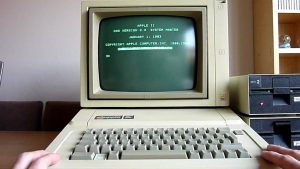 I was born in 1971. Growing up in the late 1970s and 80s, magnet schools were part of my public school experience. I went to a Science and Technology Magnet School in the late 70s where there was a planetarium at my elementary school. That was the first time I was on an Apple IIe where we learned turtle logo and Olympics of the Mind. The power of these experiences enriched my learning. All of these were great roots of gifted education infused into the public schools so everybody had access to it.
I was born in 1971. Growing up in the late 1970s and 80s, magnet schools were part of my public school experience. I went to a Science and Technology Magnet School in the late 70s where there was a planetarium at my elementary school. That was the first time I was on an Apple IIe where we learned turtle logo and Olympics of the Mind. The power of these experiences enriched my learning. All of these were great roots of gifted education infused into the public schools so everybody had access to it.
Montclair, New Jersey has a significant amount of diversity and choice. In middle school, it was an open system with no walls and a level of flexibility and innovation. Then I moved a traditional high school program and went on to Yale University thinking about going to law school or teaching. I was in the teacher preparation starting my sophomore year and graduated with a teaching license. Tore up my LSAT scores and to jump full-fledge into teaching.
Your mission
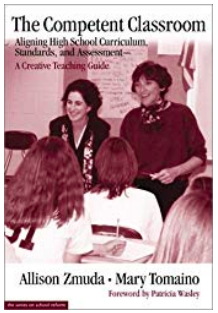
I was a high school social studies teacher in Newtown, Connecticut for eight years. When I was pregnant with my first child, I was starting to figure out how I can continue to influence the thinking not just of my students by also my peers and colleagues. I had an opportunity to write an article that turned into my very first book with my teaching partner at the time, Mary Tomaino. I wanted to think of a more flexible way of working and started my consulting career at 28. I’ve been at it for close to 19 years. I think about how to grow the heart, the energy, and the joy of what teaching and learning look like feel like and sounds like. That’s been my mission from the very beginning. How we can continue to create that level of joy, passion, energy, and focus while there’s so much anxiety, stress, and worry that not only our students are demonstrating but, clearly, our teachers are as well?
Experiences in middle school
What’s on my mind right now is that we need to look at middle school different than high school should look like. We need to consider the social-emotional aspect of learning and how we can continue to capture energy and life as they transition from elementary to middle school. We’re trying to grow the compassion and empathy as well as cognition as part of their middle school experience.
It is about these kinds of timeless experiences where we believe what we’re doing is in the best interests of the students and also grows the entire school culture. It also involves the willingness of the faculty to grow their possibilities and imaginings of what it is that they can hope for themselves and their students.
Purpose of learning
Learning from mistakes video on ASCD http://www.ascd.org/Publications/ascd-authors/allison-zmuda.aspx
I met Jay McTighe @jaymctighe and Grant Wiggins @grantwiggins early in my career who became my professional mentors, coaches, and colleagues. I was working at a regional center in Connecticut working with magnet schools in the Hartford area that grew my thinking about the possibilities of magnet schools all over again. I also started to think about how to make school more interesting for both kids and adults. That’s when my daughter told me she wanted to learn how to play the ukulele, buy her own ukulele, and then teach herself how to play using YouTube. [This is Barbara: I found a YouTube video on how to strum the Ukulele.]
When a child is interested in something, they go about it organically. It is very different than what we as educators might imagine. I asked Zoe what she wanted to do with the ukulele and she said it was a stress reliever and unwind. Every child and adult needs to figure out a way of unwinding and also giving themselves a level of energy and joy. What they want to learn is connected to motivation or purpose. Why am I doing it in the first place? Trying to grow discovery can be an action plan, something they want to do in a genius hour, or like my daughter, learning to play the ukulele.
What experience changed you?
I had a stroke when I was 37. It was terrifying. I was at my daughter’s soccer field when she was in kindergarten. I tried to stand up and cheer her on and I couldn’t stand up. It turned out that I fell over and immediately an ambulance was called. At the hospital, they performed surgery. When I woke up, I was not able to speak with maybe two or three words in my vocabulary. I was also paralyzed on my right side. After 72 hours, the paralysis worked its way out, but the speech didn’t. I was conscious and my mental faculties were okay the whole time, but the ability to explain my thinking was so highly tortured.
It was interesting because I had turned in to the editor the one book I had written by myself. I knew 6-8 weeks down the road that my book was going to come back to me and I would have to edit it one last time. Trying to think about how to grow my capacity to speak, to write, to communicate. The work I do as a consultant is organic and grounded in what the school or district is imagining. It’s not a canned presentation and every site is different. When I was going through rehab, one of the first persons who worked with me said that I was probably not able to work again. This was 2010.
[Barbara here. Listen at 28:10 to how Allison was determined to come back after this altering life event.]
LearningPersonalized.com
My company is just me. Learning Personalized grew out of how do we create a like-minded community of teachers, parents, students, and administrators around the idea of personalized learning. What are the challenges, problems that they are having? What are some of the success stories? Learning Personalized was sort of an act of community to continue to grow the thinking of people in that space.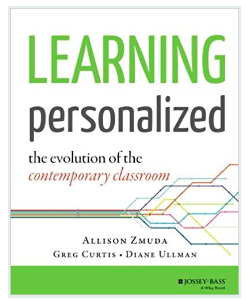
As part of my consulting, educators have the ability to share their stories or something in a blog on my site. The idea is to for teachers and administrators to help us have a window into their journey even if they are uncomfortable about sharing and that level of risk-taking. You are now focusing on being an engineer, an architect, or an artist as opposed to anyone who is perfecting anything. That is the spirit of what the community is trying to do. It’s messier because children are going shoulder-to-shoulder with you on that journey. It is growing you as an educator.
The secret of writing books
The secret of writing eleven books is that only one was written solely by me. One of the things that I find incredibly enriching is to think, imagine, and co-create with other authors and consultants. The interesting part about that is it is as much a thing to grow my thinking as it is something I do on behalf of a readership. It’s always a little bit selfish, in that to be in this space where you’re imagining ideas together with another author is just so enlightening. Barbara captured most of my books here.
Students at the Center
Video: Personalized Learning with Dr. Bena Kallick @benakallick and Allison Zmuda
Dispositions for Students and Educators
When you are starting to think about dispositions, it would be helpful to isolate an example that we agree is important. When you are thinking about goals or feedback, there are related dispositions that teachers and students need to grow into. If they are going to be able to create meaningful work and conversations around both of those areas. For example, when you start thinking about feedback, what are the most important roles from a classroom teacher’s point of view when they are providing feedback to students? Based on my continuous collaboration with Dr.Bena Kallick with Students at the Center, feedback is as much an act of teacher’s questioning and problem posing as it is delivering information on how to improve it.
Often times, we jump to guide them before we have a good understanding of what was the intention of what the students were after in the first place. From a student’s point of view, I have to be open to the idea of continuous learning. When we are engaged in rich and robust feedback, often we are looking at making it actionable and regular, but it doesn’t always get to the heart to do on behalf of the learner. We’re trying to grow students’ understanding of the value of feedback and the notion that feedback is something that is accessible from others and knowing that they are growing from their own self-analysis and improvement.
Four attributes of personalized learning
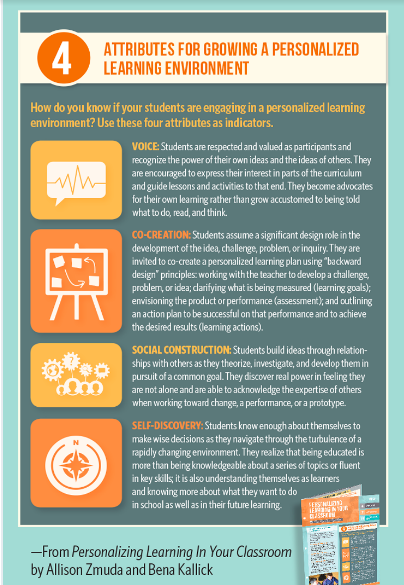
****
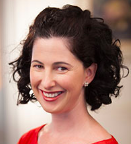 Allison Zmuda is going on 17 years as a full-time education consultant specializing in curriculum, assessment, and instruction.
Allison Zmuda is going on 17 years as a full-time education consultant specializing in curriculum, assessment, and instruction.
She works with her clients to imagine learning experiences that are worthy of the pursuit for both students and educators, designing work that is relevant, meaningful, challenging, and appropriate. Since 2001, she has co-authored 10 books, her most recent being The Quest for Learning (Solution Tree), co-authored with Marie Alcock and Michael Fisher and released October 2017, and Students at the Center: Personalized Learning and Habits of Mind (ASCD) co-authored with Bena Kallick, which was released January 2017.
In addition to her consulting work, Allison curates learningpersonalized.com, a website community comprised of her writing and that of colleagues and other educators. She has also developed a series of online personalized learning courses with Bena Kallick, available on Eduplanet21.
Allison lives in Virginia Beach, VA with her husband and two teenage children.
You can follow Allison on Twitter (@allison_zmuda), Facebook, LinkedIn, or reach her via e-mail at allison@allisonzmuda.com.
Website: https://learningpersonalized.com
ASCD Author Page: http://www.ascd.org/Publications/ascd-authors/allison-zmuda.aspx
*****
Interested in checking out more of the Rethinking Learning podcasts and reflections, click on the podcast tab at the top, the logo below, or go to https://barbarabray.net/podcasts/
For more information about Barbara’s new book, Define Your WHY, go to this page or click on the image of the book for resources, questions, and links.







